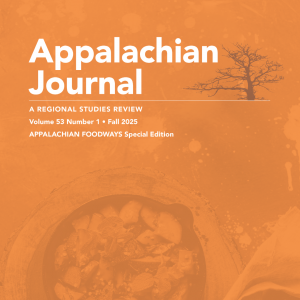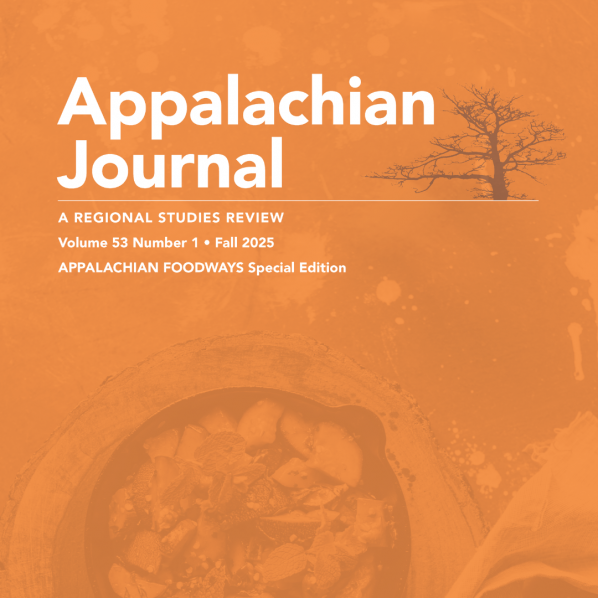BOONE, N.C. — The new issue of Appalachian Journal: A Regional Studies Review (vol. 53, no. 1) focuses on the foods and recipes that enrich and reflect Appalachian culture, including the cross-cultural influences reflected through foodways. This issue includes scholarly articles from Sarah Trautwein and Eleanor Weedman and creative nonfiction and essays exploring the influence of food in the region, as well as poetry, interviews, and book reviews.
In the scholarly article “Joj Joj Božemoj! It’s Only a Nut Roll,” Sarah Trautwein explores West Virginia foodways through her work as a folklorist and through her own family’s Czechoslovakian and Appalachian coal mining roots. Trautwein examines how foodways narrate unique family, labor, and regional histories, particularly in the lives of women. Eleanor Weedman analyzes how Black women’s understandings of community can be rooted in the kitchen in her scholarly article, “Opulent Kitchens: Crystal Wilkinson’s Use of Food as a Source of Affrilachian Identity.” Weedman explores Wilkinson’s use of “culinary dozens” as reflective of Wilkinson’s lived experience and the experience of Affrilachian people across the region.
Erica Abrams Locklear interviews writer Crystal Wilkinson, exploring the complexities of being Black in Appalachia, as well as the ways in which food provides the basis for the “kitchen ghosts” in Wilkinson’s work. Wilkinson speaks to her grandparents’ influence on her writing and understanding of foodways, as well as how the imagery of Sankofa has impacted her work.
Shepherd University instructor Clay Morris writes of his experiences teaching an Appalachian Foodways course using weekly readings and assignments on their own experiences with food with an emphasis on Indigenous and Black foodways in the region. Barry Whittemore offers up buckwheat as a food product that contains nutritional value alongside a sustainable method of production in Appalachia. Ken Badgett tells the story of cooks at Camp Raven Knob as they sourced, prepared, and disposed of food for thousands of campers over the years.
In “Memories of Stained Fingertips and Caramel Frosting,” Renea Winchester recalls the value placed on walnut trees during her childhood and the process of preparing black walnut cake with her grandmother. Marie Bisseriex’s creative nonfiction delves into her French book club’s fascination with Renea Winchester’s representations of Appalachian food and those who prepare it in Outbound Train.
Twelve poets and artists are featured in this issue, including some first-time contributors: Thomas Rain Crowe, Kate Cruz, Hilda Downer, Marc Harshman, Ali Hintz, Caleb Johnson, Ricardo Nazario y Colón, Elaine Fowler Palencia, Amy Le Ann Richardson, Steven D. Rubin, Jim Veteto, and G.C. Waldrep.
Four reviewers discuss a number of works considering Appalachian foodways and farming. Tonya Nagle reviews Appalachia on the Table: Representing Mountain Food and People by Erica Abrams Locklear. Kami Ahrens explores The Food We Eat, the Stories We Tell: Contemporary Appalachian Tables, edited by Elizabeth D. Engelhardt with Lora E. Smith. Tucker Seifert analyzes Modern Moonshine: The Revival of White Whiskey in the Twenty-First Century, edited by Cameron D. Lippard and Bruce E. Stewart, and Joseph Bathanti unpacks The Farm at Black Mountain College by David Silver.
For current subscribers, this issue has been mailed. To order this issue of Appalachian Journal or to subscribe, visit appcenter.appstate.edu/appjournal.
Related: Appalachian Journal debuts open-access expansion As the Crow Flies
###
About the Appalachian Journal: A Regional Studies Review
Appalachian Journal: A Regional Studies Review, founded in 1972, is an interdisciplinary, peer-reviewed quarterly journal housed at Appalachian State University. The journal features field research, interviews and other scholarly studies of history, politics, economics, culture, folklore, literature, music, ecology and a variety of other topics, as well as poetry and reviews of books, films and recordings dealing with the Appalachian Mountains region. Learn more at appjournal.appstate.edu.
About the Center for Appalachian Studies
The Center for Appalachian Studies promotes public programs, community collaboration, civic engagement and scholarship on the Appalachian region. The center is committed to building healthy communities and deepening knowledge of Appalachia’s past, present and future through community-based research and engagement. Learn more at appcenter.appstate.edu.
Written by Dr. Jessica Cory
Edited by Lauren Gibbs
October 13, 2025
BOONE, N.C.

